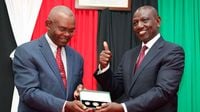CBK, investor standoff drives interest rates to 16-year high
A standoff between investors and the Kenyan government over interest rates escalated this week after the sale of the October Treasury bond raised less than 20 percent of the Sh35 billion on offer.
Latest data show that the State only raised Sh6.3 billion out of a target of Sh35 billion as investors sought higher returns, suggesting they have better alternatives.
The rates investors are asking for are the highest in over 16 years, surpassing the previous highs seen at the end of 2015 and early 2016 when they touched 16 percent.
Also read: NCBA to raise interest rates for second time
CBK data show that investors encouraged to hold out for a premium by the government’s high fiscal deficit, demanded an average of 18.46 percent on the reopened five-year bond and 17.96 percent on the reopened two-year bond in the dual-tranche sale.
They offered the State a total of Sh12.3 billion in the sale, out of which just half was taken up at average yields of 17.99 percent for the five-year and 17.74 percent for the two-year tranches.
Analysts said that despite the government only floating short-dated bonds in recent months, investor preference has been to park their funds in the 91-day Treasury bills in order to avoid exposure to losses on bonds if yields keep going up.
This applies to investors such as banks that hold bonds for sale, with a rise in secondary market yields translating into lower prices for their paper.
Analysts reckon that investors are also keeping their powder dry to take advantage of a possible issuance of a tax-free infrastructure bond in the near term.
“The auction was significantly undersubscribed with a performance rate of 35.2 percent. This can be explained by… investors hedging against duration risk given rising interest rate environment preferring to invest in T-Bills,” said analysts at Sterling Capital.
“The CBK rejected aggressive bids by accepting 51.2 percent of total bids across both bonds as a signal to investors that it will not yield to investor pressure to accept expensive debt.”
The ability of the monetary regulator to keep fending off expensive bids has, however, been tested in recent bond sales, given the need to balance between this stance and meeting the government’s domestic borrowing targets.
This fiscal pressure, analysts say, is one of the reasons interest rates on bonds of a duration of between two and five years have steadily crept up to just below 18 percent from 14 percent in June.
Concerns over the rising cost of domestic debt have also seen the Treasury revise the net borrowing target for the current fiscal year to Sh415.3 billion from the initial budgeted amount of Sh586.5 billion.
The government has also sought to relieve the fiscal pressure by sanctioning a reduction of the recurrent budget of ministries and departments by 10 percent.
The lower borrowing target is being pegged on an increase in tax revenue by nearly a third—in a tough economic environment— and access to higher borrowing from the external markets, comprising a mix of commercial and concessional loans.
There is also concern about the transmission of the high-interest rates to private sector credit costs, which threatens the growth of the economy by making it hard for businesses to borrow for investment.
“In view of the above we foresee the CBK being more accommodative of higher investor bids in debt auctions at least in the near future,” said the Sterling analysts.
Although the CBK was hopeful that the reduction of the domestic borrowing target would result in a fall in interest rates, investors have opted to wait and see if the promised higher external borrowing will materialise before lowering their rate demands.
External market conditions remain difficult for sovereign borrowers due to elevated global interest rates and heightened risk aversion arising from defaults in issuers such as Ghana and Zambia.
Also read: Banks increase interest rates for seventh straight month
Kenya also faces significant refinancing pressure in the near term on the $2 billion Eurobond that matures in June 2024.
CBK governor Kamau Thugge told news agency Reuters on the sidelines of the ongoing World Bank and IMF annual meetings in Morocco that Kenya was eyeing commercial loans worth between $500 million and $1 billion from the Trade & Development Bank and the African Export-Import Bank, to be used for buying back part of the Eurobond and for budgetary support. BY BUSINESS DAILY










Post a Comment